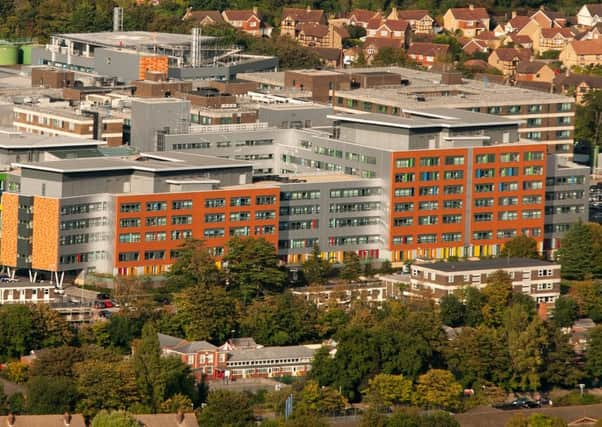Hospital A&E has spent 134 days on black alert '“ in just a single year


Figures obtained from Portsmouth NHS Hospital Trust, which runs the QA, show a stark increase since 2013 in the number of days on which black alert was declared.
The declaration is formally categorised as Operation Pressures Escalation Levels.
Advertisement
Hide AdAdvertisement
Hide AdThe city hospital was at OPEL 4, the worst, for more days each year.
Last year the hospital spent 134 days on black alert, up from 87 days in 2015 and 68 the year before that.
Gerald Vernon-Jackson, Liberal Democrat opposition leader at the city council, said the problem was with hundreds of people were medically-fit but unable to be discharged from the hospital.
As revealed by The News, 240 people are stuck in beds at QA, in Cosham, a month as the trust spends £2m each month on the problem.
Advertisement
Hide AdAdvertisement
Hide AdCllr Will Purvis from Portsmouth City Council said: ‘It is worrying to see that, far from improving, the crisis at QA just gets worse and worse.
‘The government needs to recognise that the hospital is in desperate need of more support.
‘Their finances are crippled by the PFI and the A&E is unable to cope with increasing demand locally.’
A spokeswoman for Portsmouth Hospitals NHS Trust said: ‘The safe care of our patients is our key priority and we strive to ensure that we never compromise patient safety, regardless of the pressures we are under.
Advertisement
Hide AdAdvertisement
Hide Ad‘We monitor each patient through a set of safety metrics which puts a series of checks in place to make sure no patient comes to any harm. Like many other acute hospitals up and down the country Portsmouth hospital has seen a rise in demand year on year.
‘Our demographic means we see a large number of frail, elderly patients whose acuity is high.
‘This means there is pressure on flow through the hospital, from the “front door” of the hospital which is the emergency department through to wards and therefore timely discharge of patients. Our ambulance partners, SCAS, are one of the best in the country for non-conveyance rates (meaning they see and treat and keep people at home), but they have similarly seen a year on year rise in volume of patients needing urgent acute hospital care.’
The NHS defines OPEL 4 as: ‘Pressure in the local health and social care system continues to escalate leaving organisations unable to deliver comprehensive care.
‘There is increased potential for patient care and safety to be compromised.’
It is the worst rating out of the four OPEL grades.